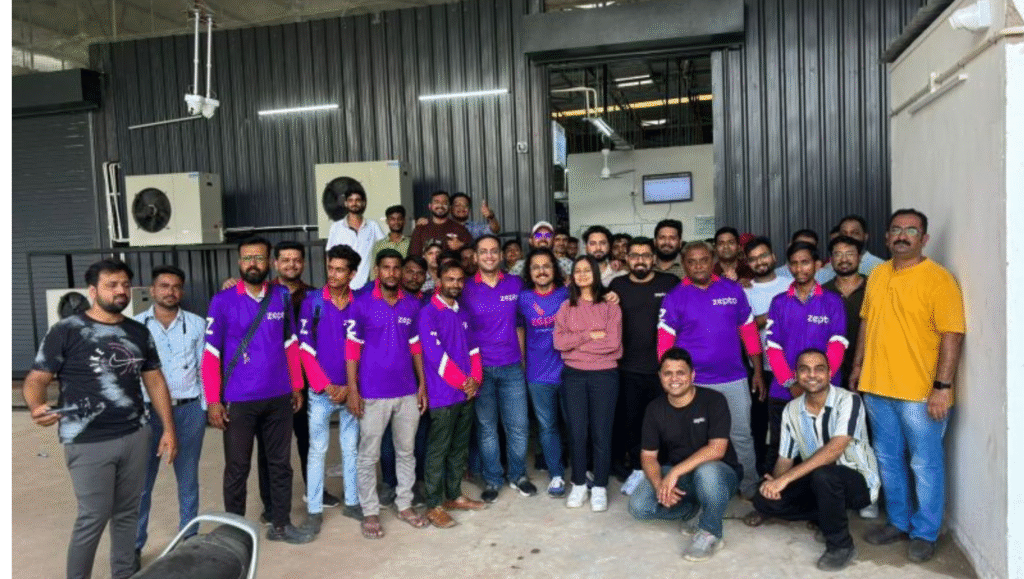
Zepto, the fast-commerce behemoth with “fresh in 10 minutes,” is under increasing fire as its Sewri warehouse in Mumbai continues to be stuck in unhygienic conditions despite repeated Food and Drug Administration (FDA) raids across its warehouses.
A Reality Check at the Tokershi Jivraj Road warehouse revealed a horrific sight: grime-covered floors, uncovered crates of vegetables teeming with flies, pools of stagnant water breeding mosquitoes, and rotting food sitting next to fresh produce.
These reports, after the FDA temporarily suspended Zepto’s Dharavi warehouse license, reveal fundamental hygiene failures, raising questions about the safety of India’s thriving USD 350 billion e-commerce industry growing at a 23% CAGR.
The Sewri warehouse, a key hub in Zepto’s Mumbai operations, was put under the scanner following a tip-off that led to a Times Now investigation, in continuation of the FDA’s May 31 raid on Zepto’s Dharavi warehouse. The Dharavi inspection, conducted by Food Safety Officer Ram Bodke on behalf of Joint Commissioner Mangesh Mane, found fungal growth on food, spoiled stock stored with fresh stock, damp and dirty floors, and faulty cold storage equipment, against the Food Safety and Standards Act, 2006.
Assistant Commissioner Anupamaa Balasaheb Patil suspended the Dharavi license under Section 32(3), directing closure until compliance is met.
At Sewri, things were no different. Times Now saw a foul odor, flour stuck on floors, broken eggs all over racks, and no segregation of rotten from fresh produce, contrary to the claim of thrice-daily cleaning by the warehouse manager. Employees turned away journalists, closing doors to hide the filth. These are ongoing conditions despite FDA notices placed at Zepto’s Bhiwandi, Bandra East, and Borivali warehouses, with Borivali temporarily shut down before restarting after part fixes.
India’s instant-commerce market, fueled by players such as Zepto, Blinkit, and Swiggy Instamart, is all about speed at the cost of safety. Zepto, which has a valuation of USD 5 billion and operates in 100 cities, has hyperlocal warehouses in cramped locations, leading to suboptimal storage.
A 2024 FICCI report identifies that 60% of India’s 26 million tonnes of yearly food wastage is due to poor storage, with fast-commerce websites adding to it by way of hasty operations. Mumbai, where 70% of its households are dependent on online groceries as per a 2024 Nielsen survey, is at higher risks from such fails.
A 10,000-strong Reddit community, ‘F*** Zepto,’ denounces the company for “dark patterns” and poor quality, echoing increased consumer skepticism.

Zepto’s reaction is focused on remedial action. A representative said, “Keeping the highest levels of food hygiene and safety standards in place is not negotiable. We have already launched an internal audit and are closely collaborating with the authorities for full compliance.” The company is carrying out facility audits and expects to start Dharavi operations, but no details or timeline for Sewri was given.
The FDA is tightening its grip, with Joint Commissioner Mane threatening, “The warehouse will shut down until Zepto rectifies all the violations.” Plans for additional inspections at other fast-commerce platforms hint at wider regulatory oversight. Exorbitant operating expenses, at 12% of the order cost compared to 8% in China, restrict hygiene spends, according to a 2024 SIDBI report. MSMEs, providing 40% of fast-commerce products, find it challenging to comply because of limited resources.
Skill gaps, with only 5% of Skill India’s 2 million trained workers proficient in food safety tech, and infrastructure issues like inconsistent power in Mumbai’s industrial zones, costing operators Rs. 1–2 lakh monthly, compound the problem.
Government initiatives provide a respite. The Open Network for Digital Commerce (ONDC) streamlines compliance for small sellers, enhancing accessibility by 35%. PM Gati Shakti will reduce logistics costs by 20%, alleviating supply chain tensions. The Food Safety and Standards Authority of India (FSSAI)’s FoSTaC program is scaling up training to cover skill gaps. However, regulatory lags in certifications (4–6 years vs. China’s 2) and low operator awareness discourage progress.
Experts call for action. Sanitation upgradation can be funded through subsidies under the Technology Upgradation Scheme. Expansion of FoSTaC training can bridge skills gaps. Improving 5G and power reliability through PM Gati Shakti will stabilize operations. Public-private partnerships involving IITs can create affordable sanitation technology. CII-led campaigns can generate consumer pressure for safe practice.
Zepto’s Sewri warehouse, remaining dirty even after FDA raids, exposes the compromises of “fresh in 10 minutes.” While quick-commerce remakes India’s retail landscape, hygiene and safety are not negotiable.
With operational, skill, and infrastructure challenges addressed, Zepto and its competitors can regain the trust of consumers so that fast delivery never comes at the cost of public health.
